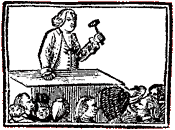Considering the Consent of the Colonists
 Here’s another interesting article from the Boston Review: Barbara Clark Smith’s 2004 essay “Revolutionary Consent: What the public life of American colonists can teach us about politics.” Smith writes:
Here’s another interesting article from the Boston Review: Barbara Clark Smith’s 2004 essay “Revolutionary Consent: What the public life of American colonists can teach us about politics.” Smith writes:
Who could question that...people had gained important freedoms during the Revolutionary era and the transformative years that followed?Smith warns against evaluating the late colonists’ political expectations by a yardstick created in Jacksonian America or later. In particular, she sees an important difference between how we elect representatives and other officials today and and how the town and county meetings of early America did so:
And yet there existed in colonial America elements of liberty, forms of participation in public affairs, that later generations would not experience. I want to raise the possibility that some (not all) colonial Americans were not so much less free than succeeding generations as differently free.
We want and expect to consent “before-hand,” choosing known candidates who espouse known policies and who do their best to enact those policies when they reach office. . . . We are less accustomed than colonial Americans were to thinking of our policymakers as better or wiser than us, or born to rule over us.That deference to the genteel was indeed a hugely important factor in eighteenth-century life. That said, Massachusetts towns had a tradition of composing “instructions” to their representatives to the General Court right after each election. Though the town’s representatives had the authority to vote as they chose over the next year, the voters’ sentiments (as expressed, almost always, by other gentlemen) were made clear and often published.
I think Smith does a good job of reminding us that the American Whigs weren’t fighting so much for the personal rights that fire up people today as for the rights of communities to govern themselves, including the power of the local majority to make rules for everyone. She says of that tradition of self-government:
These were not individual rights, and indeed, nothing so misleads us about the 18th century as the tendency to understand “the people” as a mere assembling of individuals. What authorized the people’s presence was not individuality, but rather the subjects’ capacity to hold their liberties in common. . . .The major voices for individual rights in pre-Revolutionary Boston weren’t the town’s political leaders, clamoring for “liberty.” Rather, it was the men in disagreement with the great majority of the community who had to speak up for their right to disagree, or stand apart. Usually these were supporters of the royal government, such as businessman Theophilus Lillie and (supposedly) the Rev. Dr. Mather Byles.
What might this understanding of 18th-century popular participation teach us? First, it helps bring home the sense of dire grievance that drove many 18th-century colonists to resistance and revolution. We see easily enough why colonists would object when, beginning in the mid-1760s, Parliament laid taxes and passed laws to bind the king’s North American subjects, bypassing provincial legislatures altogether. We understand their impassioned defense of elected assemblies, their cry of “No Taxation without Representation.” Surely it was safer to be ruled by not very representative neighbors than by not at all representative strangers.

No comments:
Post a Comment